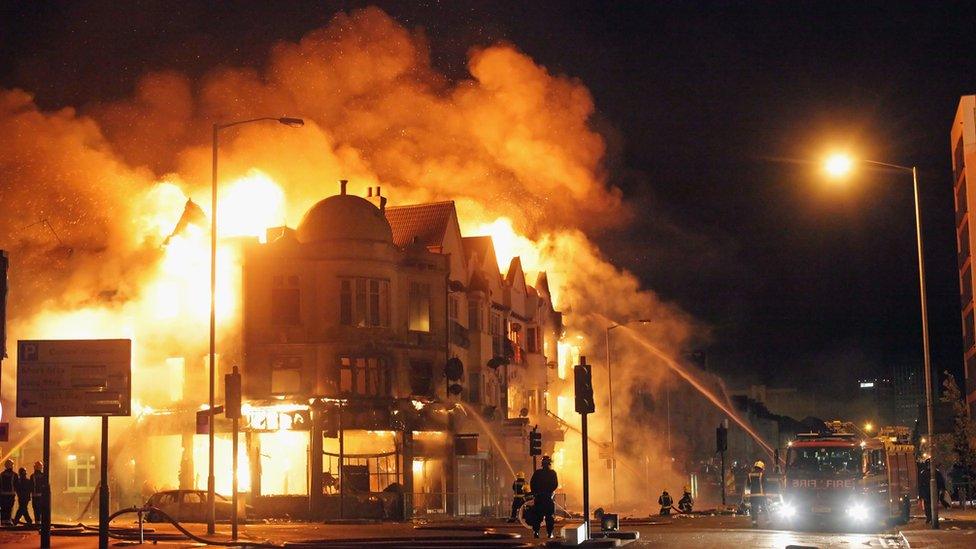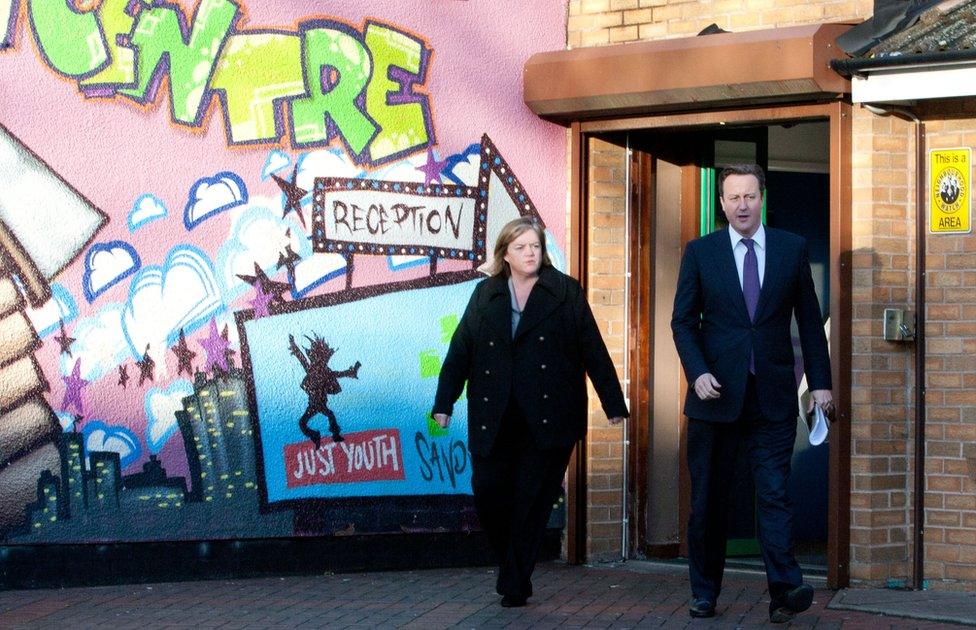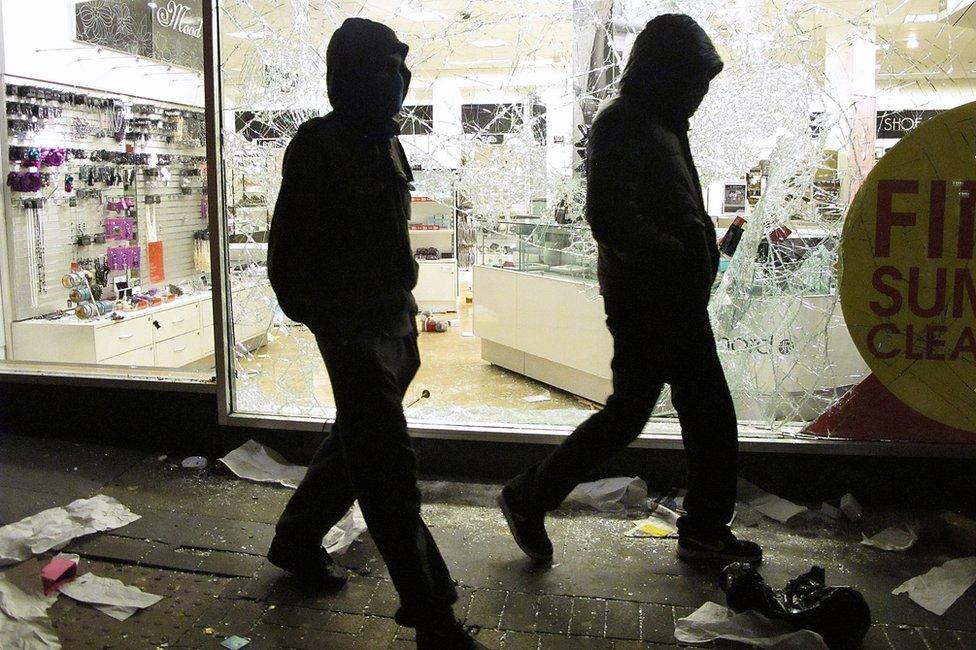Troubled Families report 'suppressed'
- Published

An unfavourable evaluation of the government's flagship policy response to the 2011 riots has been suppressed, BBC Newsnight has learned.
The analysis found that the Troubled Families programme had "no discernible" effect on unemployment, truancy or criminality.
The initial scheme sought to "turn around" 120,000 households at a cost of around £400m.
The local government department denies that the report has been suppressed.
A spokesperson said: "There were several strands to the evaluation work commissioned by the last government and there is not yet a final report."
The report, which the government has had since last autumn - and seen exclusively by BBC Newsnight - is embarrassing for ministers, who not only implemented the scheme, but have since decided to extend it. Officials have told Newsnight that they believe it would have been published, had it been positive.
Ministers had trumpeted previous data related to the scheme, which had suggested that 98.9% of families participating in the scheme had been "turned around".
Furthermore, a second wave of the Troubled Families programme was announced in June 2013, and began to roll out in April 2015. It covers another 400,000 families at a further cost of £900m.
The scheme was aimed at those affected by high unemployment, truancy and anti-social behaviour, and ran across England. It was intended to save money and prevent future rioting by reducing the problems of this group of disadvantaged families.
A senior civil servant told Newsnight that the report is "damning", and attacked the scheme as "window-dressing".

David Cameron and the former head of the Troubled Families programme, Louise Casey
Troubled Families was a project pushed by the last prime minister. In August 2011, shortly after the riots, David Cameron announced that he would "put rocket boosters, external" under existing plans being drawn up in Whitehall "with a clear ambition that within the lifetime of this Parliament we will turn around the lives of the 120,000 most troubled families in the country".
In December 2011, the then prime minister added: "Some in the press might call them 'neighbours from hell'. Whatever you call them, we've known for years that a relatively small number of families are the source of a large proportion of the problems in society."
The government also committed that the effectiveness of the policy would be measured by a consortium of analysts led by a consultancy called Ecorys. The evaluation was expected to be published. But the document has been kept under wraps thus far in Whitehall.
No measurable impact
This official analysis of data from 56 local authorities covering the first 18 months of the programme states: "The lack of obvious effect from the programme across a range of outcomes indicates that the programme did not have a measurable impact on families within the time-frame over which it was possible to observe its effects."
It found "no discernible impact on the percentage of adults claiming out-of-work benefits" and "no obvious impact on the likelihood that adults were employed" 12 or 18 months after starting on the programme.
The analysis also found it "did not have any discernible impact on adult offending" seven to 18 months after the family was booked into the programme.
They added: "Whilst it was more difficult to match the treatment and comparison groups when looking at child outcomes, the findings suggested that the programme also had no detectable impact on child offending."
Their analysis of truancy got different results depending on how the data was analysed, leading analysts to conclude that "any impact that the programme had on the absence rate was not robust".
The researchers reported some problems with data quality and representativeness. "The sample sizes that the national administrative data provided meant that it was feasible to detect impacts which were relatively small in magnitude," they wrote.
The trouble with Troubled Families
The Troubled Families programme always had strange design features.
Each local authority was given a target number of families to identify and recruit for the scheme - getting a payment of £3,200 for each household that they signed up.

The Troubled Families programme was a response to the riots in 2011
The choice of families - households with some combination of factors such as truancy, anti-social behaviour and adult joblessness - did not seek to identify people involved in rioting. The ambition of the scheme was that the family would be assigned a single, co-ordinating key-worker, external who adopts a "persistent, assertive and challenging" approach and can "get to grips" with the whole family and look at the family "from inside out rather than outside in".
But the success criteria were very vague - families could be deemed "turned around" even while the children were still persistently truant or committing crime, just so long as they did so less frequently than they had done before. And councils received a further payment of £800 when the family met certain criteria that meant they were deemed turned around. Local authorities, therefore, had strong incentives to declare successes: lots of councils claim to have had 100% success rates.
Nationally, 98.9% of the 118,000 families in the scheme were deemed "turned around" - a remarkable success rate in any policy, let alone one working with people who have complex and multiple disadvantages. These figures were taken as proof of the success of the scheme.
Speaking in June 2015, Dame Louise Casey, until recently the civil servant in charge of the scheme, said: "It's fantastic news that the programme has now turned around the lives of so many troubled families. That's almost 117,000 families where kids are back in school and youth crime and anti-social behaviour has been cut, and in more and more of these homes an adult has now moved off benefits and into work."
Stephen Crossley, a researcher at Durham University who has been examining the scheme, has described the success rate as "unbelievable", external.
A civil servant involved in the Troubled Families scheme, however, argued that while the programme might not work effectively "more money for social work probably can't be a bad thing right now".
For more on this story, watch Chris Cook's report on BBC Newsnight at 22:30 BST on BBC Two - or catch up afterwards on iPlayer